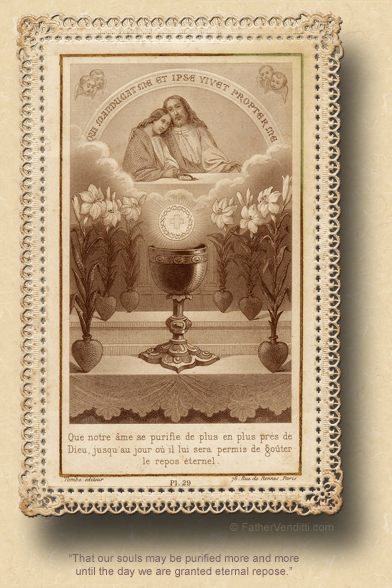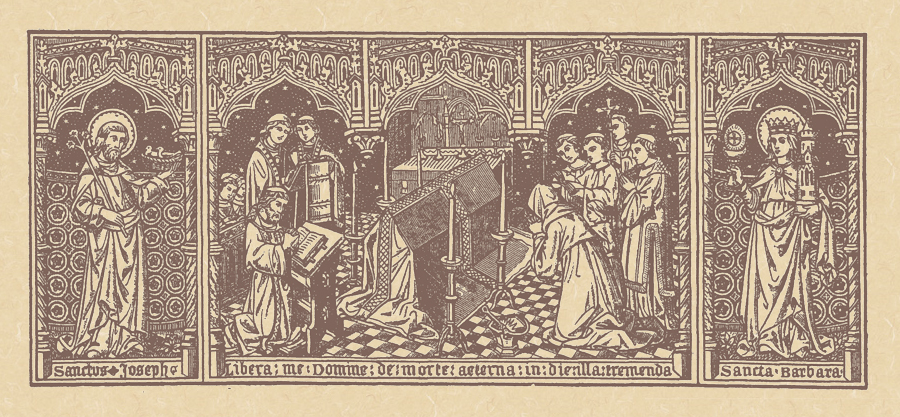How Not to be Afraid of Judgment.
The Thirty-Second Sunday of Ordinary Time.
Lessons from the primary dominica, according to the ordinary form of the Roman Rite:
• Wisdom 6: 12-16.
• Psalm 63: 2-8.
• I Thessalonians 4: 13-18.
[or, 4: 13-14.]
• Matthew 25: 1-13.
The Twenty-Third Sunday after Pentecost.
Lessons from the dominica, according to the extraordinary form of the Roman Rite:
• Philippians 3: 17-21; 4: 1-3.
• Psalm 43: 8-9.
• Matthew 9: 18-26.
The Twenty-Third Sunday after Pentecost (the Eighth after the Holy Cross); the Feast of Our Venerable Father John the Merciful, Patriarch of Alexandria; the Feast of Our Venerable Father Nilus; and, the Feast of the Holy Martyr Josaphat, Archishop of Polotsk.*
First & third lessons from the pentecostarion, second from the menaion for both the Martyr & the Patriarch, fourth from the menaion for the Martyr, fifth from the menaion for the Patriarch, according to the Ruthenian recension of the Byzantine Rite:
• Ephesians 2: 4-10.
• Hebrews 4: 14—5: 6.**
• Luke 10: 25-37***
• John 10: 9-16.
• Luke 6: 17-23.
FatherVenditti.com
|
 8:07 AM 11/12/2017 — In today’s Gospel lesson, our Lord is on about a theme He lights on quite frequently about staying awake and keeping watch, keeping our eyes fixed firmly on the goal of eternal salvation and not allowing ourselves to be distracted or derailed by temporal concerns that have little to do with salvation. If fits well with the theme with which this month began: the celebration of the saints and the remembrance of the dead. Previously, He had used a parable about a servant who’s left in charge while his master is away, and who wisely resists the temptation to nap or allow himself to be distracted away from his duties because he doesn’t know when his master will return. His instruction to us is that we should always keep our souls prepared for judgment because none of us know the day or the hour we might be called to stand before God’s throne. 8:07 AM 11/12/2017 — In today’s Gospel lesson, our Lord is on about a theme He lights on quite frequently about staying awake and keeping watch, keeping our eyes fixed firmly on the goal of eternal salvation and not allowing ourselves to be distracted or derailed by temporal concerns that have little to do with salvation. If fits well with the theme with which this month began: the celebration of the saints and the remembrance of the dead. Previously, He had used a parable about a servant who’s left in charge while his master is away, and who wisely resists the temptation to nap or allow himself to be distracted away from his duties because he doesn’t know when his master will return. His instruction to us is that we should always keep our souls prepared for judgment because none of us know the day or the hour we might be called to stand before God’s throne.
In today’s lesson he gives us another parable, and it’s based on an ancient Jewish wedding custom very different from our own. As you know, when people get married in this country, the custom is for the bride and groom not to see each other before the wedding, and she walks down the isle with her father and is met at the foot of the altar by her groom. But in our Lord’s time, the groom always went to the bride’s house to collect her, and they went together to his house where the wedding was to take place. The bridesmaids would wait for him outside with lighted lamps. Interestingly enough, this custom is still observed in the Byzantine Tradition, at least in the Ruthenian Catholic Church in which I served. In the Ruthenian Church, the wedding of a Ruthenian Catholic, by law, must take place in the parish church of the groom—it may not take place in the church of the bride—and the groom goes to her house and picks her up with her bridesmaids and brings her to the church, where they are met at the doors of the Church by the priest, who leads them together down the isle to the Royal Doors of the sanctuary, while the cantor chants the Invitatory Psalm.
So, there you have a cultural context to understand our Lord’s parable a bit better. The bridesmaids wait outside the bride’s house with lighted lamps for the groom to arrive and collect his bride. In the specific case presented by our Lord in the parable, the groom is late. Call me irreverent, but I like to think maybe he was having a bit too much fun at his bachelor party, and lost track of time. In any case, he’s late, and the bridesmaids waiting for him have fallen asleep.  Some of them had the foresight to bring extra oil for their lamps, but some of them didn’t, and they got shut out. Some of them had the foresight to bring extra oil for their lamps, but some of them didn’t, and they got shut out.
What our Lord is teaching us today is that it’s not enough just to have started out on the path that leads to Christ; we have to remain on it, ever alert, because the natural tendency of every person is to lower the level of self-giving that the Christian vocation requires. Little by little, almost without realizing it, the soul gives in to the tendency to make Christ’s call compatible with a comfortable existence. We have to be eternally on our guard against the pressure of an environment whose guiding principle is the insatiable search for comfort and the easy way. If not, we end up like the foolish bridesmaids of our Lord’s parable: at first they are full of good will and the passion of religion, but they quickly get tired of waiting, and fall asleep.
Just so. You know well the theme that had permeated my preaching all summer long, and continues now that winter is on our doorstep: “Our one purpose on earth is to work out our salvation. Everything else is just window dressing.” Don’t yet carve it on my headstone, since I think I still have a few more years left. But it is never a bad thing to continually remind ourselves that we no have more important a duty as Christians than to see to it that our souls are ready right now to meet our final judgment, just in case.
May our blessed Lord keep us ever vigilant, and grant us the grace to make frequent use of the sacramental tools He has given us, so that, when the day comes, we won’t have to walk toward our particular judgment in fear, but in the confident assurance that a merciful and just judgment awaits us.

* Following the feast and postfestive period of the Holy Cross (Sept. 14th through 21st), the Greek Church actually labels these Sundays as “Sundays after the Holy Cross” and begins to number them accordingly, while the Ruthenian and Russian Churches continue to number them as "Sundays after Pentecost" (though in some older Ruthenian typicons the Greek custom is observed). The historical context of this custom was the Greek practice of marking the birthday of the Emperor Augustus on September 23rd, which they regarded as the first day of the Church year. It was not until the fall of the empire that the new year observance was moved to Sept. 1st throughout the Churches of the Byzantine Rite.
John was elected Melkite Patriarch of Alexandria in 609. He is called "the Merciful" because of his great and generous love for the poor. He died in 619.
Nilus was governer of Constantinople at the time of Emperor Theodosius the Great. In 309 he gave up his high position and his family to retire on Mount Sinai where he become a simple monk. He died in the year 430, and left behind many writings on the spiritual life.
Josaphat was born into the Ukrainian Orthodox Church in Poland in 1623, but was received into the Catholic Church and joined the Basilian Order, which was—and is—a monastic community of the Ruthenian Catholic Church. After the establishment of the Ukrainian Catholic Church—which split from the Ruthenian Church for nationalistic reasons—he became its first bishop, and spent his life working to bring Orthodox Christians into union with Rome, and these efforts led to his murder (through the official biography of him cautiously avoids accusing the Orthodox of complicity in his death). He was canonized in 1867, the first Eastern Catholic to be raised to the dignity of the Altar.
** Inasmuch as the Apostolic lesson for both the Martyr and the Patriarch is the same, it need only be sung once.
*** The four Gospels are all read in their entirety in the Byzantine Churches, and the reading of each begins with a great feast. The Gospel of St. John begins with Pascha, and is read until Pentecost. The Gospel of St. Matthew begins with Pentecost, and is read until the Feast of the Holy Cross, after which the Gospel of St. Luke is read all the way through until the Great Fast; but, because the Divine Liturgy is offered only on Saturday and Sunday in the Great Fast, the left-over passages are read in the last six weeks of the Matthean and Lucan cycles. This is why the Byzantine Churches begin the reading of Luke’s Gospel on the Sunday after the Holy Cross no matter where they are in the cycle of "Sundays after Pentecost." The Epistles, on the other hand, are read continuously without any adjustment, creating a discrepancy between Epistle and Gospel. This year, there is a discrepancy of two weeks. In the Byzantine Churches, this is commonly called "the Lucan Jump." Thus, today, the Epistle sung is the one for the current Sunday after Pentecost, and the Gospel the one ordinary sung two week's hence.
|

